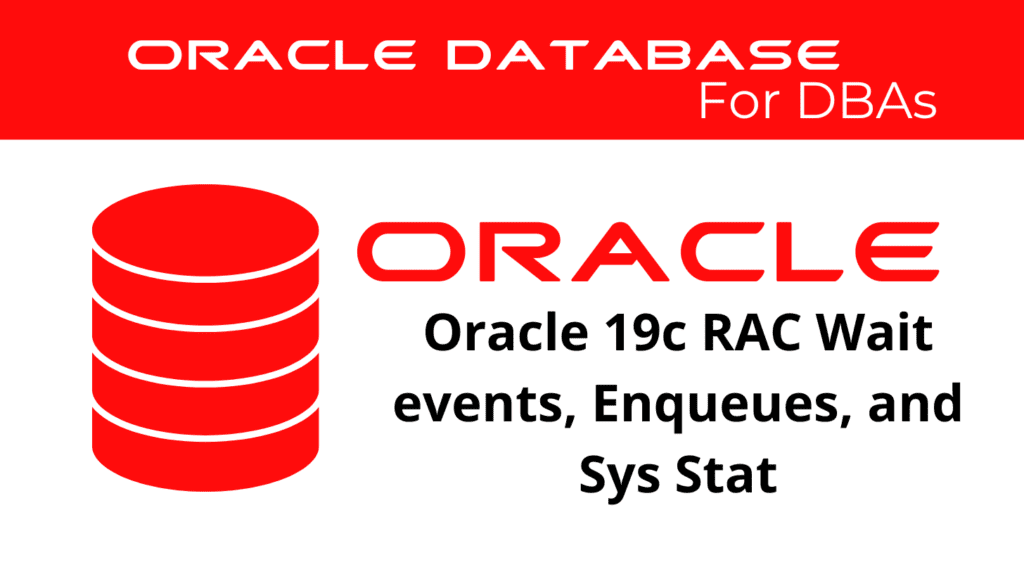
Understanding RAC-specific wait-events, global enqueues, and system statistics in Oracle 19c is essential for database administrators to ensure optimal performance and efficient resource utilization in a Real Application Clusters (RAC) environment. In this tutorial, we will explore various aspects of RAC Wait Events and Global Enqueues, focusing on how to effectively manage these elements to enhance Real Application Cluster Waits and System Statistics. Grasping these concepts is crucial for maintaining a well-organized and high-performing database system.
RAC Wait Events
RAC Wait Events are crucial indicators of the performance and health of a RAC environment. Identifying and resolving these wait events can significantly improve the overall efficiency of the cluster.
Common RAC Wait Events: These events include wait times for global cache operations, interconnect issues, and contention for shared resources. Understanding and monitoring these events is key to optimizing RAC performance.
-- Checking RAC wait events
SELECT inst_id, event, total_waits, time_waited
FROM gv$system_event
WHERE event LIKE 'gc%';
Managing RAC Wait Events: Effective management involves identifying the root causes of wait events and implementing solutions to minimize their impact. This can include tuning the interconnect, optimizing cache fusion, and balancing workloads across nodes.
-- Example of tuning RAC interconnect
ALTER SYSTEM SET "_gc_defer_time" = 10 SCOPE = BOTH;
Global Enqueues
Global Enqueues are mechanisms that manage resource locking and synchronization across the nodes in a RAC environment. Proper handling of global enqueues ensures that resources are efficiently utilized and that contention is minimized.
Understanding Global Enqueues: Global enqueues handle locks for shared resources, ensuring data consistency across nodes. Monitoring these enqueues can help identify contention points and optimize resource allocation.
-- Monitoring global enqueues
SELECT inst_id, type, id1, id2, lmode, request, block
FROM gv$lock
WHERE type IN ('TM', 'TX');
Managing Global Enqueues: Addressing global enqueue issues involves optimizing the workload distribution, tuning application code to reduce lock contention, and using appropriate isolation levels to minimize locking overhead.
-- Example of reducing lock contention
ALTER SYSTEM SET "_gc_latch_time" = 10 SCOPE = BOTH;
📢 You might also like: Oracle 19c Implement the Most Common RAC Tuning Practices (Category: RAC and GRID)
RAC Wait Events – System Statistics
System Statistics provide valuable insights into the performance and health of a RAC environment. Regular monitoring of system statistics helps in identifying performance bottlenecks and implementing corrective measures.
Key System Statistics: Important statistics to monitor include CPU usage, memory utilization, I/O performance, and network latency. These statistics provide a comprehensive view of the system’s performance.
-- Checking system statistics
SELECT name, value
FROM gv$sysstat
WHERE name IN ('CPU used by this session', 'physical reads', 'physical writes');
Optimizing System Performance: Regular analysis of system statistics helps in identifying trends and anomalies. Implementing best practices, such as load balancing, query optimization, and efficient resource allocation, can significantly enhance system performance.
-- Example of balancing workload across RAC nodes
ALTER SYSTEM SET instance_groups = 'node1,node2,node3' SCOPE = BOTH;
Monitoring and Optimization
Effective Real Application Cluster Waits and System Statistics management require continuous monitoring and optimization. Oracle 19c provides various tools and views, such as GV$ views and DBA_HIST views, to monitor the performance and health of the RAC environment.
To monitor RAC performance, you can use the following queries:
-- Monitoring RAC performance using GV$ views
SELECT inst_id, event, total_waits, time_waited
FROM gv$system_event
WHERE event LIKE 'gc%';
-- Checking RAC instance activity
SELECT inst_id, name, value
FROM gv$sysstat
WHERE name LIKE 'gc%';
Best Practices for RAC Management
To achieve optimal results with RAC Wait Events and Global Enqueues, consider the following best practices:
- Regular Monitoring: Use Oracle’s monitoring tools to regularly check the performance and health of the RAC environment.
- Proactive Maintenance: Perform regular maintenance tasks, such as tuning the interconnect, managing global enqueues, and optimizing system statistics.
- Capacity Planning: Plan for future growth by monitoring performance trends and scaling the RAC environment as needed.
Conclusion
In conclusion, understanding and managing RAC Wait Events and Global Enqueues in Oracle 19c are vital for database administrators to ensure optimal performance and efficient resource utilization. By implementing effective management techniques and following best practices, database administrators can maintain a well-organized and high-performing RAC environment. Regular monitoring and proactive maintenance are key to maximizing the benefits of Real Application Cluster Waits and System Statistics in Oracle 19c.
See more on Oracle’s website!
Be Oracle RAC and GRID Certified Professional, this world is full of opportunities for qualified DBAs!





